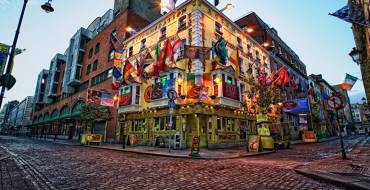
Ireland

Ireland: Casino with licenses
Based on the specifics of the jurisdiction, namely the varieties of gambling licenses in Ireland, there is no online casino with a dedicated license of the regulator. However, most gambling establishments operate based on a betting company license. That said, players from Ireland can find video slots on their websites.
The most popular bookmakers in Ireland are Paddy Power, BoyleSports, Ladbrokes, William Hill.
Ireland review
Ireland is an island nation located in Europe. It was formerly a colony of the British Crown. After numerous civil wars, the island was divided into two parts: Northern Ireland, which became part of Great Britain, and the Republic of Ireland, which gained independence.
The main areas of the country's economy are finance, agribusiness, industry, tourism and technology.
Ireland annually leads in the volume of foreign investment. That is, the financial sector is very well developed. Foreign investment should be attributed to receipts from companies receiving gambling licenses in the jurisdiction. In general, the gambling market in Ireland is estimated at more than 1 billion euros. Naturally, most of this amount comes to the country's budget in the form of tax deductions.
There are not as many people wishing to obtain a gambling license in the jurisdiction as in Malta, for example. Even despite such an attractive financial potential. This is due to the rather convoluted licensing system and strict oversight by regulators. The country has several organizations that carry out the supervisory function on various aspects.
Jurisdiction is constantly working to improve the legislative framework for the gambling industry. In 2019, a number of amendments (recommendations) suggest that Ireland should have a single regulatory body for gambling.
Gambling is legal in Ireland and is licensed. The legality of online and land-based casinos is debatable. But according to the legislation, it is possible to operate freely in these areas.
Gambling history in this country
There has always been quite a strong spirit of gambling in Ireland, and this has been particularly evident in betting on sporting events. No doubt betting on horse racing has had a particular impact. This is because Ireland ranks quite high in the world regarding the number of stud farms. At the same time, a large share is taken up by breeds of horses bred specifically for racing.
In the early 17th century, gambling in the country became quite widespread in the state's territory. Although Ireland was a British colony then, control of the gambling industry was fairly low. This meant that gambling activities went largely unnoticed without any real regulation.
After gaining independence in 1922, the new government seriously considered gambling supervision. As early as 1926, the "Betting Act" was passed. However, this measure did not make gambling more transparent. Anyone could organize sweepstakes. Therefore, in 1931, several amendments were adopted, according to which bookmakers must obtain a license to carry out their activities legally.
Naturally, apart from betting, underground casinos flourished in the country. It wasn't until 1956, when the Gaming and Lotteries Act was passed, that they came to regulate their form of gambling. However, the legalization of casinos was out of the question. They were simply banned anywhere in the country. But there was one loophole that allowed "private clubs" to open. They were all the same casinos with slot machines and tables for card games. Given these methods of "regulation," the casino gambling industry was partly underground in the country.
The rise of global gambling has not gone unnoticed in Ireland. In 2013, a law was passed to regulate gambling. And in the land-based and digital sphere (online). This law detailed the regulation methods and divided them into sports betting, lotteries, and casinos. In 2015, it was amended to clarify the activities of online bookmakers.
In 2018, a bill was drafted proposing to fundamentally change the regulation of the gambling industry in Ireland. In 2019, a special parliamentary expert group was established to analyze this law. It made several recommendations by an independent panel of experts.
The proposal was to create:
- a special Gambling Commission to deal exclusively with gambling;
- six broad categories of licenses;
- protection for consumers, children, and vulnerable persons, etc.
The bill is currently on an interim basis until the main law is approved.
Licensing authority
The Revenue Commissioner is responsible for regulating and overseeing the gambling industry in Ireland. In addition to this structure, a number of other organizations are involved in the licensing process and oversight function.
- The Office of the Regulator of the National Lottery (ORNL) regulates and oversees the operation of the National Lottery, approves new National Lottery games, and manages the National Lottery Fund.
- The Department of Justice and Equality(DOJE) issues certificates necessary to organize betting shops in the land-based and online sphere.
- The Advertising Standards Authority for Ireland (ASAI) publishes and monitors advertising standards. Quite a demanding organization, which has fined the world's bookmakers more than once.
- The district courts issue licenses for small charitable lotteries. Certify some betting company owners.
The sheer number of organizations involved in the gambling industry can be confusing for companies wishing to obtain a gambling license in Ireland. Although all application forms are available on the main regulator's website, additional authorizations will still need to be obtained. For example, a certificate from the district court is required when opening a slot machine hall.
The following types of licensing apply in the jurisdiction:
- Gaming Licence is for the premises where the slot machines are located and for the slot machines themselves
- Remote Bookmaker's Licence is necessary for accepting bets from Irish residents remotely (online).
- Remote Betting Intermediary's Licence allows an operator to provide a means for persons other than the operator to place bets remotely.
- Bookmaker's License is for a company that, in the course of its business, accepts bets, sets odds, and undertakes to pay out winning bets
- Amusement Machine License is for slot machines that fit the definition of "amusement games" are licensed. That is, participants can win any cash prize up to a maximum of 7 Euros.
The initial license fee for remote bookmakers and betting intermediaries is €10,000. The fee is calculated based on the company's turnover when the license is renewed and can be up to 200,000 euros per year.
Despite its intricacy, each organization is responsible for several functions that, in other jurisdictions, are the responsibility of a single regulator. Ireland also has anti-money laundering measures in place. Preventive measures are taken to protect the population from gambling addiction.
Unfortunately, players are practically not protected from a possible conflict with the betting company, for example, the failure to pay winnings. In this case, it will be necessary to turn to civil courts. In case of a dispute with an online casino, it will be necessary to contact the licensee who issued a gaming license for this type of activity.
Requirements for licensees
In general, registering a company in a jurisdiction is fairly straightforward, but there are some subtleties.
- Register the company as a taxpayer.
- Register with the ROS online service. To make payments etc.
- Get a certificate of competency. Issued in district courts and the Ministry of Justice.
- If documentation is provided to the tax authority, tax agents will need a special "notice" to send it to the tax office.
- Please complete an application for a license. You will be notified as soon as the application is processed.
- If the application has been approved, you must submit another application and pay the license fee.
- The company must not have any outstanding taxes.
- A premises certificate is required in case of land-based gambling.
Main applications can be made online at the Revenue Commissioner's website or by downloading a special form and mailing it in.
Conclusion
The current licensing process raises several questions. The issue of protecting players' interests is not established, and there is no clear wording regarding the legality of online casino gaming for residents of the jurisdiction. Casinoz strongly impression that it's the same as it was a few decades ago, with online casinos equated with gambling clubs and operating "underground." Meanwhile, sports betting in Ireland is regulated quite strictly in the online and land-based sectors.
Given the recent legislative changes, the jurisdiction is quite promising for gambling licensing. But since they are not in full effect, it is quite difficult to predict how exactly the gambling business will develop in the country. If we take the experience of other countries, it will take more than one year to make Ireland more attractive for gambling companies.
Frequently asked Questions
Gambling in Ireland is regulated by several laws, the key one being the Gambling and Lotteries Act 1956 and subsequent amendments. The Revenue Commissioners and the Department of Justice regulate it.
A variety of forms of gambling are legal in Ireland, including casinos, betting shops, lotteries, bingo, and online gambling. However, there are restrictions on the size and number of gaming machines in establishments.
Yes, a license is required to operate a casino in Ireland. However, the situation with land-based casinos is somewhat ambiguous, as they are formally banned but operate as private clubs.
Online gambling is legal in Ireland and is regulated by the Gambling Act 2015. Operators must be licensed by the Irish authorities to provide services to local residents.
Gambling operators in Ireland pay betting duty, which is 2% of turnover for land-based bookmakers and 1% for online operators. There is also a 25% betting intermediary duty on commission.
Yes, the minimum age to participate in most forms of gambling in Ireland is 18. The exceptions are lotteries and some forms of slot machines, where the minimum age can be 16.
Ireland is taking steps to tackle problem gambling, including supporting organizations that help players with addiction and requiring operators to implement responsible gambling measures.
Yes, Ireland is discussing the creation of an independent gambling regulator to oversee the industry. Additional measures to protect vulnerable players are also being considered.
Players are advised to play only at licensed establishments, set deposit and playing time limits, and seek help if gambling problems develop.
| Main info | |
| License types | Gaming Licence , Amusement Machine Licence , Remote Betting Intermediary's Licence , Remote Betting Intermediary's Licence , Bookmaker's Licence , Remote Bookmaker's Licence |
| Name | Ireland |
| Site languages | English |
| Website | https://www.revenue.ie/ |
| Contacts | |
| 🏠 Post address | National Stamp Duty Office Cross Blocks Upper Castle Yard Dublin Castle Dublin 2 D02 F342. |






































